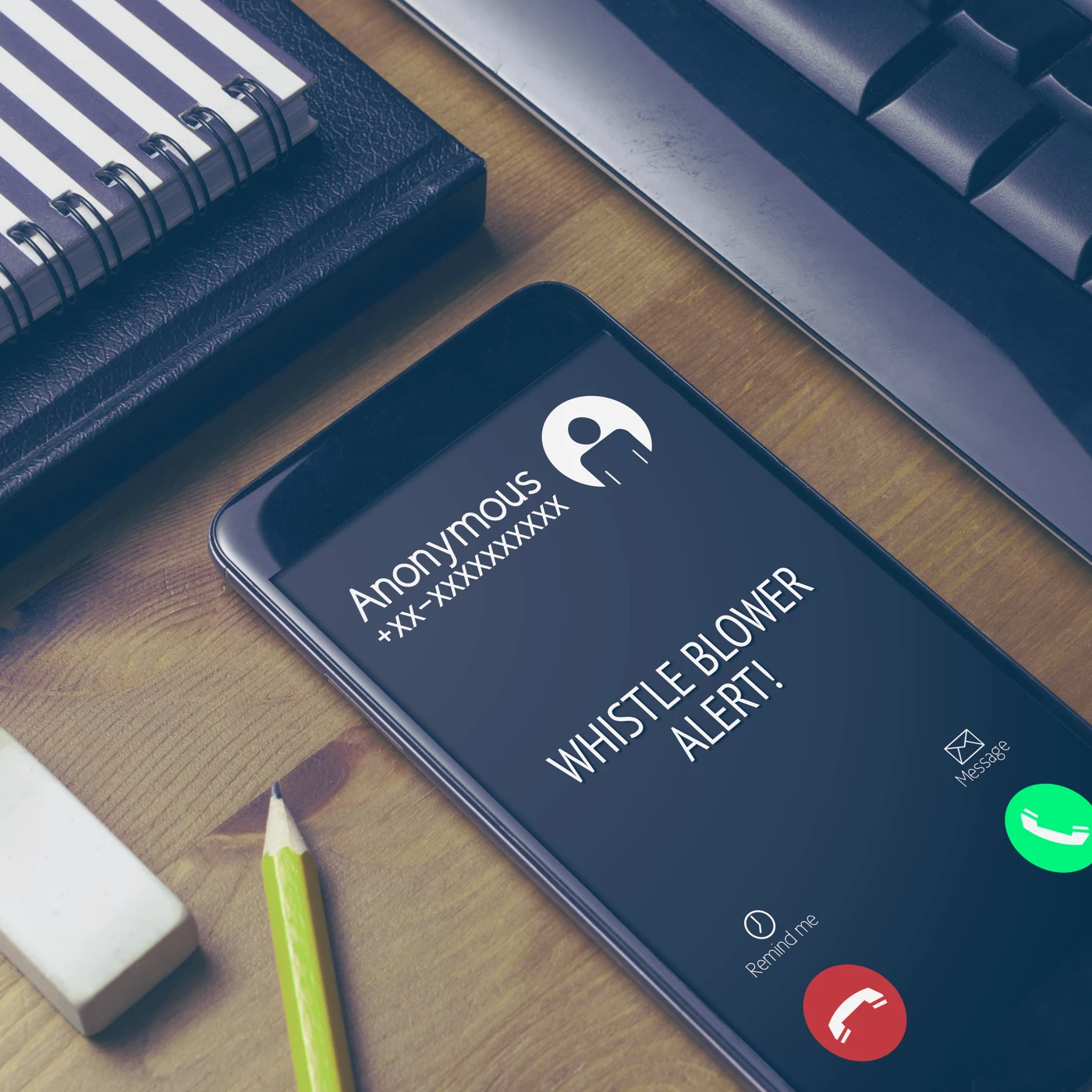
Whistleblowing
in the Autostrade per l’Italia Group
You can use this page to report possible fraud, offences, wrongdoings and any irregular conduct.
The system for receiving and handling reports, known as "whistleblowing", used in all Autostrade per l'Italia Group companies, ensures the highest degree of confidentiality in handling reports, protecting the identity of the whistleblower, the persons involved and the persons mentioned in any event, as well as the content of the report and the relevant documentation, in compliance with the provisions of Legislative Decree no. 24 of 10 March 2023.
Autostrade per l’Italia and the other companies in the Group have implemented a system for receiving and managing reports – submitted by staff and/or third parties - relating to possible violation of national or European Union regulations, breaches of internal rules (rules in the Code of Ethics, Anti-bribery Guidelines, 231 Model and in the body of company regulations), unlawful conduct and irregularities in the conduct of the business activities of ASPI Group companies.
The handling of such reports – submitted through the dedicated channels on the Group's Whistleblowing Platform - is entrusted to internal offices, meeting the requirements of Legislative Decree 24/2023, with dedicated and specifically trained autonomous staff.

Subject of reports
Object of the reports The perimeter of the violations that can be reported through the Whistleblowing system of the ASPI Group Companies is broader than that provided for by Legislative Decree no. 24 of 10 March 2023, extending beyond the violations and offences referred to in the Decree, also to alleged violations of the internal rules adopted by the Group and/or the various Companies (rules of conduct contemplated in the Code of Ethics, in the Anti-Bribery Guidelines, in Model 231 and more generally in the body of company regulations) and any other violation or irregular conduct concerning the conduct of company business.
It is possible to report violations of national or European Union regulations that harm the public interest or the integrity of Autostrade per l'Italia and the Group companies and that consist in:
- administrative, accounting, civil or criminal offences;
- unlawful conduct pursuant to Legislative Decree no. 231 of 28 June 2001, or violations of the organisation and management models provided for therein;
- offences falling within the scope of European Union or national acts;
- acts or omissions affecting the financial interests of the Union;
- acts or omissions relating to the internal market;
- acts or conduct that nullify the object or purpose of the provisions of Union acts.
Unsubstantiated news, information already in the public domain, as well as data acquired on the basis of rumours or unreliable sources are excluded from reportable breaches. Similarly, the scope of the reports does not include anything that has to do with complaints, claims or personal requests that relate to the reporting person's individual employment relationship.

Persons who may submit reports
The perimeter of the persons who may submit reports is broader than that provided for in Legislative Decree no. 24 of 10 March 2023; in fact, anyone may submit a report and the report will be handled with the utmost respect for the principles of confidentiality with regard to both the identity of the whistleblower and the reported person, as well as the contents.
Safeguards
The whistleblowers to whom the protections provided for in the Decree apply are the persons linked to one or more Group companies by any present, past or potential employment relationships, (even if terminated or not yet formalised because the hiring process has not been concluded yet).
In addition to the whistleblower, the protections also apply to the following subjects:
- the facilitator (a natural person assisting the reporter in the reporting process and operating within the same workplace);
- persons in the same work environment as the whistleblower or who are related to them by a stable emotional or family connection up to the fourth degree;
- co-workers of the whistleblower who work in the same workplace as the whistleblower and who have a regular and current relationship with that person;
- entities owned by the whistleblower or for which the same persons work, as well as entities operating in the same work environment as the aforementioned persons.
These protections are effective only if: a) at the time of the report, the whistleblower had reasonable grounds to believe that the information on the reported violations was true and fell within the objective scope of the Decree; b) the report was submitted in accordance with the requirements of the Decree

Confidentiality
The identity of the whistleblower and any other information from which this identity can be deduced cannot be disclosed, without the express consent of the whistleblower, to persons other than those competent to receive or follow up reports and expressly authorised to process such data. Confidentiality is also protected in judicial and disciplinary matters. The whistleblower shall be notified in writing of the reasons for disclosing confidential data, where disclosure of the identity of the person making the report is essential in disciplinary proceedings for the purposes of defending the person concerned.
Retaliation
The whistleblower and other recipients of the protection measures may not suffer any retaliation as a result of the report submitted (e.g., dismissal, suspension, downgrading or non-protection, change of duties, adoption of disciplinary measures or other sanction, harassment or ostracism, discrimination or any other unfavourable treatment).
Protection of personal data
The processing of personal data relating to the receipt and management of reports is carried out by Autostrade per l'Italia and the other Group companies, in their capacity as data controllers, in compliance with European and national principles on the protection of personal data, providing suitable information to the whistleblowers and the persons involved in the reports and adopting appropriate measures to protect the rights and freedoms of the persons concerned. The protection of personal data is ensured not only for the whistleblower, but also for the other persons to whom the protection of confidentiality applies, such as the facilitator, the person involved and the person mentioned in the report as being affected by the data processing. Internal reports and related documentation are kept for as long as necessary for the processing of the report and, in any case, no longer than 5 years from the date of the communication of the final outcome of the reporting procedure, in compliance with the confidentiality obligations under European and national data protection legislation.


How to report
In order to improve the effectiveness of the investigation, the submission of reports containing all the information available is encouraged, in the clearest and most complete manner possible, and representing the useful and appropriate elements to allow an appropriate verification of the validity of the reported facts. It is particularly important that the report be sent in a timely manner and include, where such elements are known to the reporting person:
- a detailed description of the facts that are the subject of the report, with an indication of the circumstances known (manner, time and place) and the manner in which they became known;
- identifying element(s) of the Reported Person(s), in so far as they are known, or elements that may allow their identification;
- names of any other persons who may report on the facts being reported;
- any documents that may confirm the validity of the report
Internal corporate Whistleblowing channels
An IT platform is available for submitting reports, which guarantees data security and confidentiality, through an advanced encryption system for communications and the database, in line with the relevant regulations.
SUBMIT YOUR REPORT HERETo monitor the status of a report sent before 01/10/2024 and/or to talk to the Reporting Management Authority click here
The system allows the submission of reports through a guided online path without the obligation to register or to declare one's personal details. At the end of the submission, a unique identification code will be displayed, which must be memorised in order to access the report later and to dialogue with the relevant offices.
This tool protects the identity of the whistleblower and makes it possible to issue an acknowledgement of receipt of the report, maintain contact with the whistleblower and request, if necessary, additions and provide feedback to the report, within the timeframe provided for by the legislation.
The offices in charge of handling Reports are also available to meet with the Whistleblower, if he/she so requests through the digital platform, to collect the Report.
The reported channels should NOT be used to send complaints and requests for assistance on commercial matters. .
For such types of communication, please click here.
External reporting channel
In addition to internal reporting channels, the Decree also provides for the possibility of resorting to an external channel managed by the ANAC to which the whistleblower may turn if one of the following conditions is met:
- the whistleblower has already submitted an internal report and it was not followed up;
- the whistleblower has reasonable grounds to believe that, if he or she were to make an internal report, the report would not be effectively followed up or that the report might give rise to the risk of retaliation;
- the whistleblower has reasonable grounds to believe that the breach may constitute an imminent or obvious danger to the public interest.
This channel guarantees, also through the use of encryption tools, the confidentiality of the identity of the whistleblower, of the persons involved and of the persons mentioned in the report, as well as the content of the report and the related documentation.
A list of Third Sector entities that provide whistleblowers with support measures (information, assistance and advice free of charge on how to report and on protection from retaliation) is available on the ANAC website.
Subject to the prerequisites and conditions provided for external reports, whistleblowers may disclose information on violations in the public domain through the press or otherwise through media capable of reaching a large number of people if one of the following conditions is met:
- the whistleblower has previously submitted a report through internal corporate and external channels or has made an external report directly and no response has been received within the time allowed as to the measures envisaged or taken to follow up the reports;
- the whistleblower has reasonable grounds to believe that the breach may constitute an imminent or obvious danger to the public interest;
- the whistleblower has reasonable grounds to believe that the external report may involve a risk of retaliation or may not be effectively followed up due to the specific circumstances of the case, such as where evidence may be concealed or destroyed, or where there is a well-founded fear that the recipient of the report may be colluding with or involved in the perpetrator of the violation.




